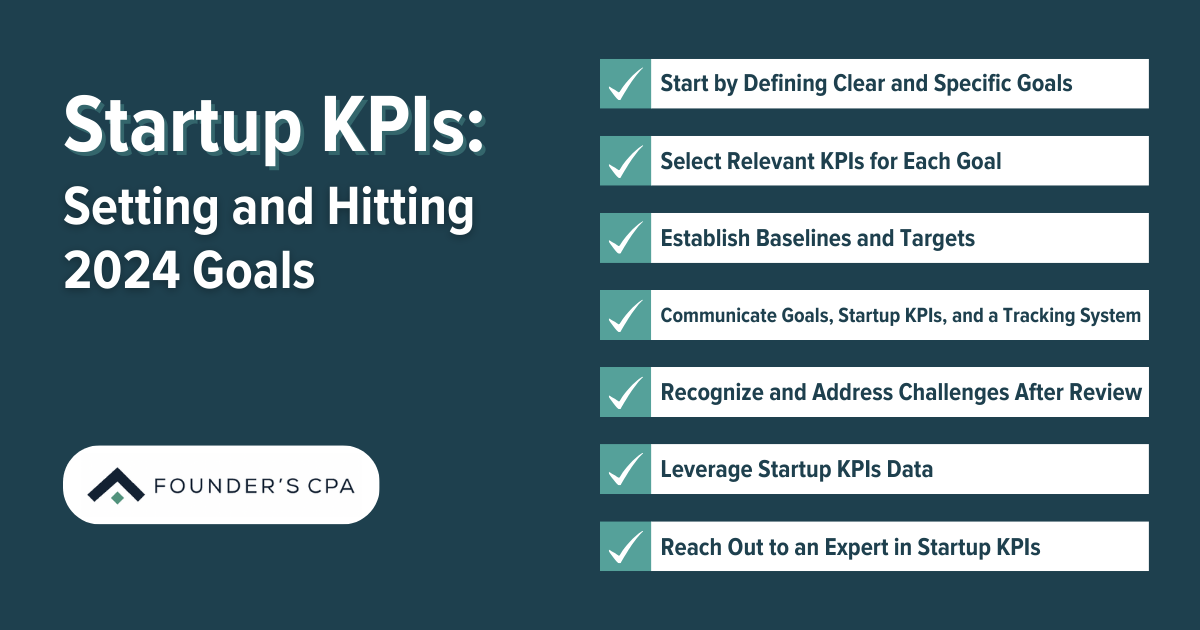Most founders understand the impact of startup KPIs and goal-setting on the business. As we race toward the year's end, have you considered the metrics you need to track to achieve your strategic goals for 2024?
That's where Key Performance Indicators (KPIs) come into play. Setting and hitting KPI goals allows founders to focus on what matters most while tracking progress toward long-term objectives.
In this post, we'll discuss KPIs, why they matter for startups of all sizes, and how you can use them to set and achieve realistic yet ambitious targets. Read on and get ready to take control of your numbers-driven future.

Start by Defining Clear and Specific Goals
As any experienced accountant will tell you, starting with clear and specific goals holds the key to success in any financial endeavor. This principle applies just as much to businesses and organizations.
One effective method is to define SMART (Specific, Measurable, Achievable, Relevant, and Time-Bound) goals. Leveraging this framework ensures that everyone in your team is on the same page and working toward the same achievable ends.
Further, aligning your short- and mid-term goals with the organization's overall mission and vision will provide a roadmap for long-term success and allow for more accurate progress tracking.
Select Relevant KPIs for Each Goal
Identifying the correct metrics to measure your success is equally important. KPIs are vital to measuring and achieving your goals. Selecting the right KPIs for each goal ensures you can track your team's progress effectively.
When choosing relevant KPIs, you must understand what you want to achieve and break it down into measurable data points. Once you've identified your goal and the metrics required to measure progress, choose a few indicators to give you the most precise picture of success. You can even customize KPIs based on the nature of the goal and standards in your industry.
Remember, KPIs are not just numbers on a chart. They can be your best tool to drive improvement and help your business grow. The right KPIs will help you:
- Analyze your performance
- Identify areas that require improvement
- Plan for success in the long run
Establish Baselines and Targets
Before measuring progress, you need to establish a baseline and targets. A clear starting point and a desired result will guide you toward success.
Setting baselines highlights our current performance and identifies areas for improvement. From there, we can establish targets to strive for, creating a roadmap to achieve your 2024 goals.
Remember, setting too-easy targets won't challenge you or your team to improve, while impossible objectives can be demotivating. Try to find the sweet spot – where you're pushing yourself while still feeling confident in your ability to achieve your goals.
Communicate Goals, Startup KPIs, and a Tracking System Across the Organization
As a startup, you need the entire organization to clearly understand your goals and the key performance indicators (KPIs) with which you'll track progress and measure success.
However, it's rarely enough to identify these benchmarks. Effective communication and a shared understanding across all teams and departments ensure everyone is working towards the same objectives.
That's why creating a tracking system aids you in achieving optimal results. Consider a software tool for efficient data tracking and analysis.
By establishing concrete goals, KPIs, and a comprehensive tracking system, you can measure your progress and adjust your strategies accordingly. This communication and tracking will foster a culture of accountability and collaboration across the organization and ensure your startup stays on track.
Recognize and Address Challenges After Review
Regular reviews allow us to evaluate projects and identify areas to improve. However, addressing challenges after a review is equally important. Ignoring identified problems is common because we want to focus on other aspects of the project or goal.
Of course, failing to address challenges can lead to:
- Repeat problems
- Delays
- Project failure
Addressing challenges after a review helps the project stay on track and ensures that we continue to provide quality service to our clients.





